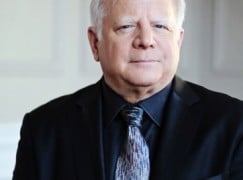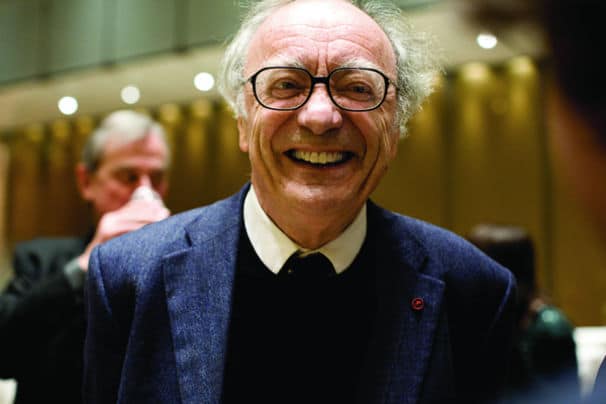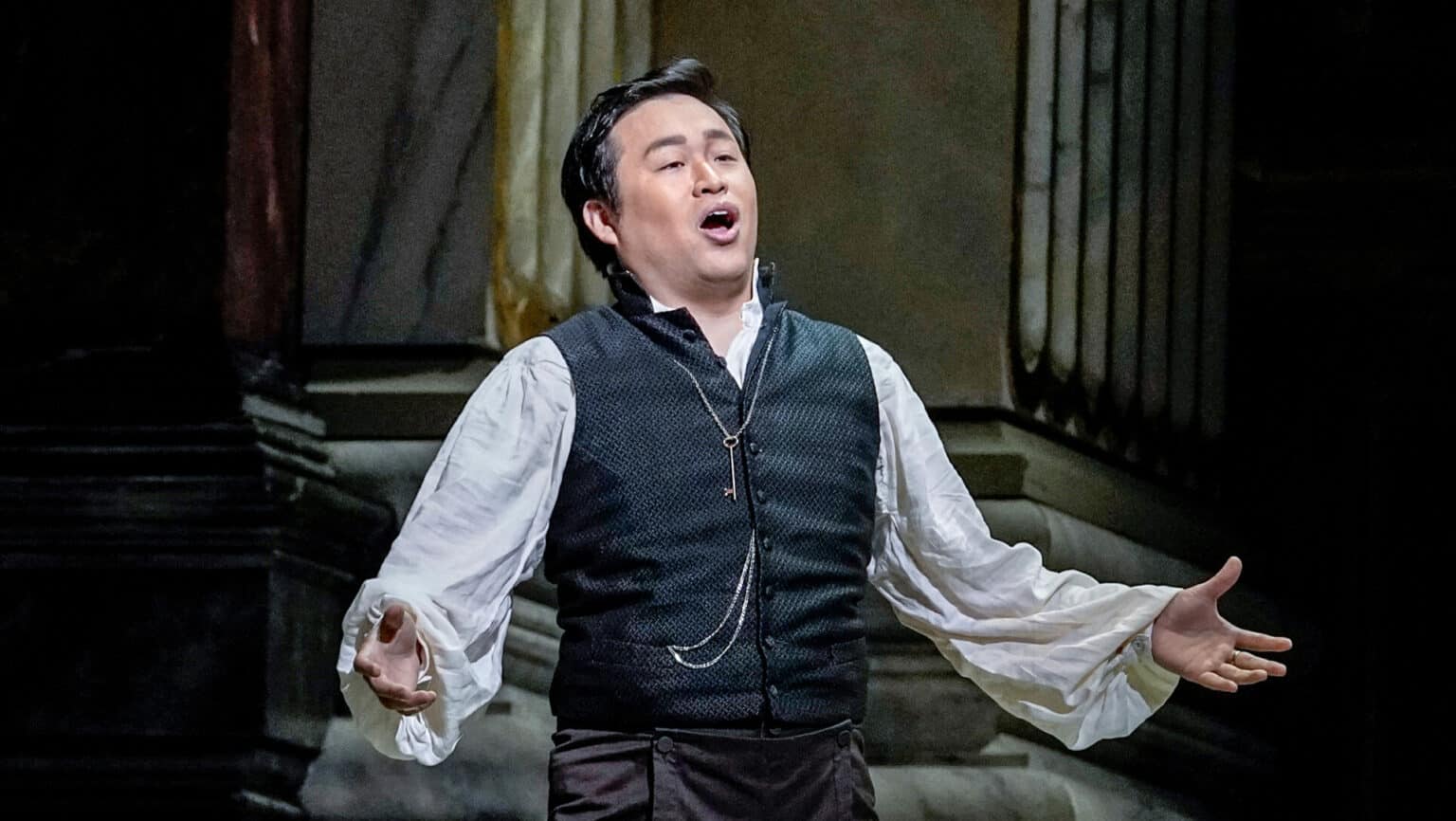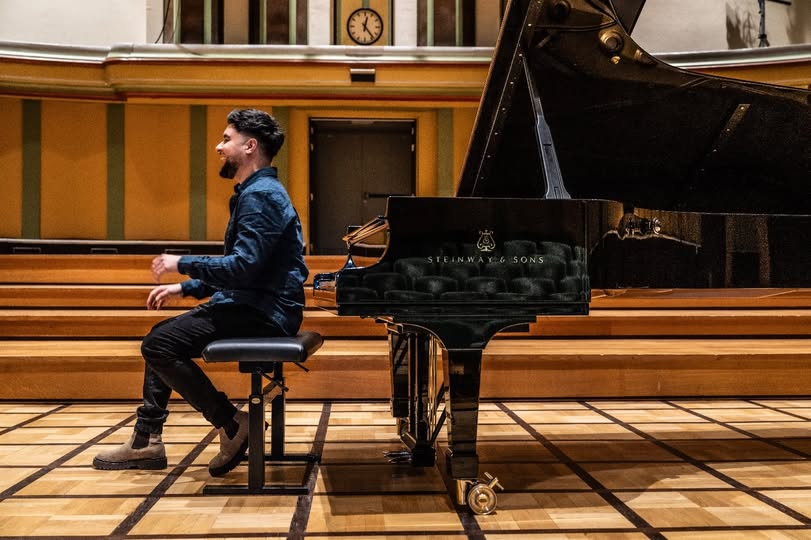Leonard Slatkin: Here’s how we judged the Cliburn
mainThe chair of the judges at the 2017 Van Cliburn Competition has responded to some of the criticism aired today in an email to Slipped Disc:
Here are three things everyone needs to understand.
The Cliburn is judged in its entirety, not just on the concerto. We listed to all 30 pianists, eliminate 10 and so on. All voting is done anonymously and we are not allowed to speak about the competetors. There is no point system, simply a yes or no as far as advancement. This is true for all rounds and is the only fair way to avoid controversies that have plagued many competitions.
During the the three solo recitals we heard many superb performances of both standard and unusual repertoire. Very few of the audience or medici viewers take the time to go through all of this and it is exhausting for both pianists and the jury panel.
As much as I would love to have some off the beaten track concerti, fiscal responsibility and rehearsal time comes into play. Each contestant has only 50 minutes plus the general rehearsal to get through their works. I met with each for 20 minutes prior to the first rehearsal. If one of the commentators on this blog wish to contribute about 400 thousand dollars for extra rehearsals, please contact the Cliburn. It is also important to remember that we do not know until the announcement of the finalists who will be playing which concerto, so that creates another set of problems.
I was proud to be head of an incredible group of pianists, each of whom brought great experience to the competition. Although I have reservations about contests in music, there is no question that the process was fair and unimpeachable. And rest assured, some of these pianists are about to have terrific careers, based on what we heard over the course of almost three weeks.

Leonard Slatkin





Slatkin is [redacted]. He killed both final Profofiev’s concertos. Need to know score before performance. Favorin and Tchaidze has to thanks him for their final performance and problems with the orchesta. PoorTchaikovsky. Hsu and orchestra didn’t communicate at all.
Did people just accept the security restrictions?
https://slippedisc.com/2017/05/fort-worth-just-got-even-worse/
I was there for the semi-finals, so went through security about 9 times. As you entered the building, they had someone with a thin stick to quickly poke around your bag/purse, and another to take your ticket. I had no issues (even with a purse which brushed against the size limits), didn’t hear of any issues, and the security staff was pleasant (enough) and efficient.
I noticed the same, and reckoned the procedure was more of a publicized deterrent than an intensive scrutiny. It was not inconvenient at all.
I enjoyed viewing the competition and you won’t hear any complaints from me. Mr. slatkin’s comments make perfect sense. I’ll admit, it would be somewhat exciting to hear the Barber concerto, or maybe Gershwin’s concerto in F, or some repertoire like that during the concerto rounds, I can see where that would be difficult to prepare.
I found the Mozart concerto round fascinating and revelatory. Hearing those works in multiple interpretations over 3 consecutive nights – a veritable deep-dive of Mozart – was extremely interesting. For me, that helped me solidify some decisions.
And the playing of the Fort Worth Symphony was really stunning. What a beautiful orchestra.
I also believe the jury got it right. I especially agree with their 1st place – 2nd & 3rd was sort of a toss up for me.
Thank you.
Mr. Slatkin makes perfect sense. Still, the universe of mainstream, familiar concerti is very large. Enough for any hopeful competitor to choose nearby, but not too, too closely.
My suggestion for future competitors might be to choose from this large, accessible array; however, choose at a reasonable margin from the very center. That is, how about either of the Brahms concerti? Just one example, there are plenty of others.
The idea is mainstream without having become stale in the venue.
Yet, OTOH, one mistake in that effort went too far the opposite way a few competitions ago. It was a Shostakovich concerto which required a trumpet which was unavailable anywhere nearer than Atlanta, and had to be contracted from there on short notice to fill the bill.
It requires thought.
Nice rebuttal – attack the critic instead of addressing the criticism.
Now, how about addressing the issue that the winner has already been playing duo piano recitals for some time now with one of the jurors, Anne Marie McDermott, and that this was pleasantly scrubbed from his competition bio?
The nepotism that this competition espouses is disgusting.
McDermott only had 1 vote, and she may have recused herself in this instance. As for any other Cliburn “nepotism ” – please be more specific. At least the Cliburn finally stopped having Yoheved Kaplinsky on the Jury, and therefore her students were noticeably absent from this year’s competition. But I look forward to the day when NO Juilliard faculty members sit on the Cliburn jury – there’s no reason for it, as there are many reputable pianists who are not associated with Juilliard.
Indeed!
There’s an ocean of pianists who’ve won major competitions and who now concertize and teach, but not any of the potential participants. It’s surprising that they have Kaplinsky, Vardi, and others who have actively coached several of the students.
But her crony, Joseph Kalichstein, was. I once heard him play the Schumann concerto WITH THE SCORE and he still was totally incapable of playing the piece. At one point, the conductor nearly stopped the orchestra.
…and the same with McDermott. I turned pages for her once on the Faure G minor quartet and she must have left out over 80% of the piece.
…and the same with Arnaldo Cohen, who I heard get lost so many times during the Liszt Sonata that people started to get up and walk out.
…and Christopher Elton, who doesn’t even play in public anymore.
Shameful that these do-nothings are invited to events such as these.
I’m especially surprised to hear this about Arnaldo Cohen, who I’ve always thought of as exceptionally talented and something of a virtuoso. Since many, many competition entrants can play, say, the Liszt Sonata at the drop of a hat, one wonders how these people could have made international reputations by failing to be able to. Or perhaps they were having an off-night.
Interesting about Cohen. He played several concerti with my orchestra over several seasons (incl. Rachmaninoff #4, Liszt #1 and Brahms D minor) and was always fabulous.
McDermott on the jury?? Give me a bleeping break. She has no business judging unless in a courthouse.
Can’t agree at all. She is an exceptional pianist. And, besides, it’s difficult to get the likes of Argerich, Pollini, and Zimmerman to show up to judge piano competitions.
Obviously comes from a MUSICIAN. McDermott has no business being in the jury of any competition let alone “Cliburn”
100% agree!.
Competitions. Liken them to floating fall leaves. Droplets of rain off a duck. They mean very little in the big picture. An artificial boost. Sad to see my former Maestro in the mix. Perhaps it is telling.
In a way, it is a relief to see that the same crass accusations – particularly from the fashionable anti-competition lobby – abound as much when I am not a jury member as when I am. And the same absence of any alternative suggestions. And as for the comment that Pollini, Zimermann and Argerich are difficult to get onto a jury: for one thing it is often untrue, but in any case, are we to assume that you equate fame and celebrity with being a good and fair jury member?
What’s up Andre-Michel Schubert; Gold medal winner of the 1981 Van Cliburn, 1977 Avery Fisher Prize and first prize of the 1974 Naumberg Competition.
Andre- Michel Schub who is 65 years old.
What’s up Nathaniel Rosen; winner of the coveted Naumberg Competition and first prize winner of the Tchaikovsky Competition in 1978? Rosen is 69.
What’s up Gustav Rivinius who took first prize in the 1990 Tchaikovsky Competition. 2nd prize 1990 Naumberg Competition; 2nd prize Rostropovich 1986; Ravinius is 52.
Could you explain what you are getting at?
Hi Peter,
I chose Argerich, Pollini, and Zimerman (whose name we both have the honor of having typed incorrectly!) specifically, as a prior post-er — whose response you might not have seen — suggested that certain members of the current jury were not sufficiently capable as pianists themselves to judge others, a view I found both distasteful and not empirically valid. I don’t think anyone would levy such charges at the likes of them, but (again, to be empirical) it is more difficult to secure a block of time from a famous touring pianist than from artists who split their time between teaching and concertizing.
Incidentally, I found one of your prior posts regarding how juries actually function to be among the most helpfully factual on the topic. I don’t understand, though, what you mean about the anti-competition crowd; nearly everyone reading here follows major competitions carefully, looking for special talent (of the likes I and many others heard in Evgeni Bozhanov, for example, several Cliburns ago). I don’t know too many who think the entire competition concept is misguided, although the few that hold that position are certainly vocal about it.
Such mean spirited comments !!!
How embarrassing and belittling!!
Bravi to all the musicians that participated and made music!
I find it quite offensive to read the ad hominem comments regarding the pianists on the 2017 Cliburn jury and others. Such comments do not contribute to the discussion whatsoever and only make a reader (at least, this reader) think that there is perhaps a grudge or jealousy of some sort.
On the matter of jury selection, why can’t the Cliburn simply make it a requirement that for jury members to serve, they must not have students whom they have coached or taught within the last 5 (or …. however many) years, as competitors. They should sign a pledge — this is done all the time in scientific review panels. Since it is quite possible that these jurors are probably chosen many months in advance and may not know until the last minute if they have students competing, they should be made to understand that they will then have to withdraw as jurors at which time replacement jurors can then be asked to serve. Of course, such a pledge could also include that they should not have partnered with any competitor …., or that they are not related to the competitor,…. one can think of other possible variations and additions. This should prevent the conflicts of interest that had arisen in the past.
I agree with you (Lina) in principle, but asking a juror to pull out at the last minute because of one student would be difficult to pull off. People block out weeks for this, well in advance.
The Cliburn is judged by each juror merely saying whether a particular contestant should pass, with no discussion among jurors. It would be easy to simply have jurors recuse themselves from judging any student they have EVER worked with. Since it call comes down to math in the end, there would simply be different denominators for each contestant.
What a shame for the chairman of the jury and conductor of “Slatkin status” to complain about lack of rehearsal time, asking for extra $$400.000 for the “war horses” concertos that EVERY decent student conductor should have memorized early at school, particularly performed with a bunch of young pianists without any personality and interesting ideas!! What a shame to listen to ruined Tchaikovsky First, Rachmaninoff Third – two absolutely substandard performances at the Cliburn Competition of the two most popular piano concertos, not only by competing pianists but, more importantly, by the conductor and the orchestra.
Or should we shut our ears and eyes, be politically correct and scream “Bravo Maestro Slatkin Bravo Mr. Hsu (who ruined Tchaikovsky) and Mr. Sunwoo (who did the same to Rachmaninoff)”?!?
I had a few days to think about it after seeing the final concerto round. Although I was not there for the first 3 concerto performers, I did attend the second round and it was clear that Hsu would rank in the top 3, and that is what I told the folks in the elevator, and he sure did. I was sitting in the front row off to the side where seeing drama of the pianist wasn’t a factor. I did not stand in ovation for the first 2 and did for only Hsu. If there is a video showing the front right side you can see me sitting until finished. Although I am a very experienced “listener” I know what I heard, and all the performances were terrific, but Hsu put it over the edge. And I’m pretty sure if I was there for the first round of concertos I would be equally impressed with who was chosen winner. To conclude, you won’t find a more fair judge than Slatkin, period.
I was with you until the final line. It’s hard to know how to determine which judges are “fair” when all one can observe is a Yes/No for each contestant.
In any case, I’d urge you to listen to Rachel Cheung’s concertos, if you already haven’t. She didn’t do the Big Russian Behemoths, but her playing was, to my ears at least, incandescent and remarkably graduated in its dynamics. Really something special. Hsu is also an incredible talent, given that he’s 19, but I wasn’t sure he should have placed above her. And, of course, she won the audience award.
I was in the front row of course when Rachael performed and she was outstanding. But unfortunately you don’t win major competitions playing Beethoven 4. I didn’t hear the Mozart however and the concertos are not available to purchase because of the union, according to the sales host at the Van Cliburn. I did purchase her semi final DVD however. This was my first live competition I attended and I can see how brutal this was for Slatkin and the competitors and it is more of an endurance contest than a competition of who played the best. Basically minimal time to practice, especially the concerto pieces. The union musicians cost money as Slatkin implies so what everyone had to adjust for, the survivors did a superb job.
She did comparatively less well in the chamber round. I think that’s your explanation, guys. Let’s not get stuck on whether Beethoven’s fourth concerto can grab a medal. Hopefully it can, all other things being equal. Rachel Cheung still made a lot of new fans, including me. See my longer comment below, thanks.
Hi David. I agree that Cheung should be judged separately from her repertoire choices, but I also think it’s a valid question whether it’s possible to play, say, Beethoven 4 well enough to win a major competition when others are playing Rach 3 or Prok 2. It cannot help when there is ANOTHER concerto round where everyone plays a Mozart concerto, so Beethoven 4 shows less of an overt contrast.
I’d rather hear Chueng play Beethoven 4 than most any other competition winner do yet another Rach 3, but the jury may have wondered about how she’d fare in heady Russian waters.
Regarding the comments about jurors recusing themselves from voting for a former student/acquaintance, consider that the best students will study with the best teachers, just as the best teachers attract the best students, and that many of the best teachers are also current or former performers. When selecting a jury for a major competition, it’s hard to avoid a juror who may not have some connection to some of the very best that show up for these events.
Regarding the perception of the lackluster jury and their qualification to pick the best winners, does it really take the most renowned collection of A-list performers to decide the top three? Regardless of the perceptions of their lack of fame or accomplishments, the members of the 2017 jury are more than sufficiently qualified to identify the best talent, just as the rest of us are trying to do here.
Michael, thanks for the level-headed take on this. At the same time, while it may be impossible to avoid juror X having given a master class with contestant Y, it should be fairly simple to exclude the Uber Teachers (like Kaplinsky), etc. There are hundreds if not thousands of prominent pianists, former top competition winners, and competent teachers who would be capable of judging.
Others here have mentioned that there’s no evidence that having taught a certain competitor introduces bias, but to me and many others — especially the competitors themselves — the key is to avoid any whiff in that direction, as it casts a cloud over the entire event, like when Fou T’song was criticized for judging his former student, Avdeeva (who won) in the Chopin competition. He is almost certainly above that but, if I were another competitor…
Thanks for your common-sense observations, Michael. This has been an aggressive discussion here, so I encourage people to check out the thread that happens to be under Norman Lebrecht’s “Colourless Competitions” editorial, because that’s where a lot of the review of the results really took place. You can see that posters (myself included) helped one another fill in some blanks, and according to the rules that Maestro Slatkin laid out, the final results do make sense.
That doesn’t change the fact that if somebody catches a lot of people’s imagination, the buzz they generated at the Cliburn might ultimately outweigh the competition results per se. And that’s fine, too. If and when I see Rachel Cheung at a concert in the future, for example, the moment she sits down to play, it really doesn’t matter what exact prize she did or didn’t win at the 2017 Cliburn.
Sure, everyone has their own frustration with the judging. Mine was toward the middle of the competition, when the jury kept advancing a couple of young guns who tended in my judgment to play too fast, too loud, too early, with too much pedal smudge and too little interpretive arc. I could have stood to hear more instead from not only Alina Bercu, who I’ve mentioned elsewhere, but also Sergey Belyavskiy and Luigi Carroccia. In fact, if you want to see a good moment that I remember in the hall, call up Belyavskiy’s preliminary round recital and go to the end of his performance of Taneyev’s Prelude & Fugue in G-sharp minor. He does a clever, sudden final accelerando and then lightly flips off the last two notes, generating a laugh from the audience. That’s a real instinct for entertainment, and so I wasn’t surprised that Belyavskiy went for the rough humor in the Beethoven Eroica Variations in the next round. But we’re talking about these pianists now, and that’s all good.
I think the debate about warhorses is never-ending. I mean, if you personally don’t want to hear any more Tchaikovsky and Rachmaninoff concertos, fine, don’t come. I’m happy to hear what emerging artists can do with this material … and along the way also hear a Janacek sonata, a couple of the Shostakovich preludes & fugues, the Kabalevsky rondo from Van Cliburn’s 1958 victory, one of Lera Auerbach’s preludes, and Ligeti’s ridiculous and wonderful Devil’s Staircase. Congratulations to Leonard Slatkin and the jury, to Jacques Marquis and the staff, to the people of Fort Worth, and to all 30 pianists who performed at the 2017 Cliburn.
David, I did read that “colourless competition” editorial and the comments (and even posted a regrettable comment there), but I found Lebrecht’s basis to be snarky and unhelpful. Overreaction I’m sure, but I feel that perspectives such as Lebrecht’s in that post is detrimental to encouraging the real artists.
Agree on Bercu. Her Bach was exquisite and original. Dasol Kim and Cheung deserved more recognition. Favorin, Sunwoo, and Schmukler were superb in the earlier rounds, just stunning. I would gladly pay to hear these six again, and I hope I will.
Thanks Michael. To clarify, I was pointing to that particular post merely to identify where people can find the fullest discussion of the competitors in the comment section. I wasn’t endorsing Norman Lebrecht’s own opinion – although he’s certainly entitled to it, it’s his website.
I think it’s great that we’re identifying people who are not otherwise being discussed but had an impact. Ilya Shmukler is such an interesting case. His preliminary round recital was fantastic. But in the next round he took Bach’s poor chaconne and pretty much beat it to a pulp, and it wasn’t entirely Ferruccio Busoni’s fault 🙂 I suppose Shmukler had the misfortune of performing it the same round as Daniel Hsu did. Trust me, you won’t believe the difference. Still, I’m very glad to know Ilya Shmukler’s name going forward.
To quote Slatkin: “Although I have reservations about contests in music”… [they paid me enough to repress my principles”
That is a crass remark, made anonymously – as so often crass remarks are. I think Slatkin is owed an apology. I, myself, also have reservations about contests in music; those reservations are complex, and need not be gone into yet again here. But I do not repress my principles because the fees are good. [Actually by comparison to concert fees – particularly in the case of a celebrated conductor – they are not.] Put your chip away Mr/Ms Pianista, and think before you snipe. And while you are at it, own up to who you are.
Dear Maestro Donohoe! As measured and “well–tempered” as your remark is, allow me with all due respect to say that no conductor of Maestro Slatkin’s statue should try to blame inadequate performances on lack of rehearsal time for piano concerti like Tchaik. 1 and Prkfv. 3, suggesting an additional $400.000 for rehearsals!! After all, these concerti a war horses of piano repertoire. This is appalling and unprofessional. Particularly that, as you most correctly pointed out, Maestro Slatkin’s conducting honorariums are incomparably higher than even rather considerable “Cliburn” jury+conducting gig!
So I would not be so harsh on “Pianista”! S/he has made a very good point!!! And crass it is really NOT! Slatkin is not impartial to money issues as he very convincingly proved by trying to extort some extra “pocket cash” from donors for rehearsing a couple of warhorses!!! Not cool!
Mr. Donohoe,
It is just as you said: there is no need to express reservation, as he did, in a written defense of a music contest. (What artist doesn’t have reservations, by the way?) But isn’t it ironic, coming from the chair of the competition! I found many of the criticisms in the article in question, and in the above comments, to be crass and unfounded. Mine is just facetious.
I also have reservations, but I will share mine:
Judges with students in the competition should be redacted from judge panels. It is nonsense to argue that 20 impartial, qualified judges cannot be found “due to the few working with the highest caliber students”. While Mr. Slatkin’s response was appropriate and showed how the Cliburn is designed fairly, it doesn’t account for teachers who may still protect their interests and promote their own agendas first. Impartiality is an impossibility, but let us minimize the risk.
For that very reason, the author of these opinions will remain anonymous, like the judges’ opinions. Secondly, I wish my ideas to be taken for their face value, not influenced by my “status” as chair, judge, artist, professor, amateur, student, or otherwise.